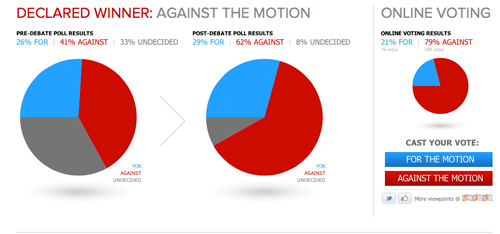It couldn't be more black or white than this: "Spy on me, I'd rather be safe."
That was the proposition before two teams of debaters at the Intelligence Squared U.S. debate held Wednesday night in Washington, D.C. Defending the proposition were two former homeland security officials Richard Falkenrath and Stewart Baker. Opposing the motion were the ACLU's very own Senior Policy Counsel Michael German and Georgetown Law Professor David Cole.
By the end of the debate, the civil libertarians decidedly ruled the day, moving 21 percent of the audience to their side and achieving a 62 percent majority against the proposition, "Spy on me, I'd rather be safe."

There's something to take from this, even if you dismiss it as wonky fun. When pro-surveillance advocates are pitted against civil libertarians who not only argue against dragnet surveillance on principle but because it simply doesn't work, the fear wanes and people see mass surveillance for what it is: unconstitutional and un-American.
As German, a former undercover FBI agent, made clear, the idea that a balance must be struck between liberty and security is a false choice. The procedural safeguards—such as reasonable suspicion and probable cause—that govern how government agents do their jobs doesn't only protect our liberties and privacy, it makes them better investigators who better protect the public from violent threats.
German knows this better than anyone—it was a life he once led:
In my undercover work against neo-Nazis and anti-government militias, there were a lot of people saying things I didn't like. But I knew I had to have a reasonable basis to assume somebody was engaging in violent activity or illegal activity. Otherwise, if I couldn't find that, I could turn my attention to somebody else. Because, again, there are real threats and this standard helped me focus my investigations properly so those cases successfully prevented terrorist attacks, ended in successful prosecutions, and didn't violate anyone's rights.
This is why we shouldn't be surprised that the government can point to only one terrorism case that was even arguably prevented in part by the government's program that gobbles up the records of nearly every domestic call made inside the United States. And that's even in dispute. Three senators who sit on the Senate Select Committee on Intelligence recently told a federal court in California that the government's claims that the mass call-tracking program played a "but-for" role in preventing this plot was a "misleading exaggeration that has distorted the public record."
It's also why we shouldn't be surprised that when faced with the facts of how government surveillance works—or doesn't work—the audience voted overwhelmingly against the proposition, "Spy on me, I'd rather be safe."
They understood that it's foolhardy, in German's words, to sacrifice "privacy for the illusion of security."
Learn more about government surveillance and other civil liberties issues: Sign up for breaking news alerts, follow us on Twitter, and like us on Facebook.
var mytubes = new Array(4); mytubes[1] = '%3Ciframe allowfullscreen=%22%22 frameborder=%220%22 height=%22281%22 src=%22//www.youtube.com/embed/98BIu9dpwHU?autoplay=1%22 width=%22500%22%3E%3C/iframe%3E'; mytubes[2] = '%3Ciframe allowfullscreen=%22%22 frameborder=%220%22 height=%22281%22 src=%22//www.youtube.com/embed/98BIu9dpwHU?autoplay=1%22 width=%22500%22%3E%3C/iframe%3E'; mytubes[3] = '%3Ciframe frameborder=%220%22 height=%22281%22 marginheight=%220%22 marginwidth=%220%22 scrolling=%22no%22 src=%22https://fora.tv/program_landing_frameview?id=19122%26amp;type=clip%26amp;autoplay=1%22 thumb=%22https://www.aclu.org/files/imce_images/blog_images/blog-mikegermanvideothumbnail-500x280.png%22 width=%22500%22%3E%3C/iframe%3E'; mytubes[4] = '%3Ciframe frameborder=%220%22 height=%22281%22 marginheight=%220%22 marginwidth=%220%22 scrolling=%22no%22 src=%22https://fora.tv/program_landing_frameview?id=19122%26amp;type=clip%26amp;autoplay=1%22 thumb=%22https://www.aclu.org/files/imce_images/blog_images/blog-mikegermanvideothumbnail-500x280.png%22 width=%22500%22%3E%3C/iframe%3E';

